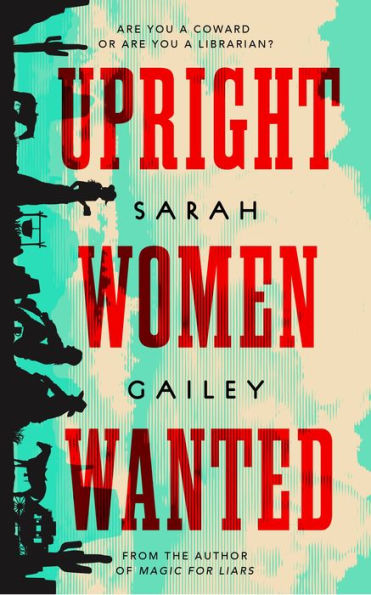Libraries are magical. We know this, as readers: Rare is the book lover who can’t recall the moment of sheer wonder and exhilaration the first time they understood what it meant to use a library. All of these books! For free! (As a librarian, I still feel the same way—just remember to bring them back, please and thank you!)
Depictions of libraries within the fantasy genre have certainly embraced this magical feeling…and run with it. Fantasy libraries can be (almost) neatly categorized into three essential magical types: the library containing all books regardless of written-status; the library where the books speak to each other; and the library as portal to other worlds/places. But what’s truly magical about these fantasy categories is the way these magics correspond with the way libraries work in the real world.
First up in our consideration of Library Bibliomancy, we look to the library of all the books that ever have been or ever will be written. (Only slightly less well known is the library of books that will never be written.)
Everyone who has ever claimed to be a writer has also had the experience of the friend who said, “Oh, here’s a good idea for a book that you should write…” Well, here is where those books are housed. Not only that, but the books that people mean to write, eventually, if they could just find the time. Or the book that they’ll write when they finish these other books (either writing or reading them…).
But libraries are, of course, the breeding grounds for future books, even in the real world. Librarians are stewards of future authors. We love to encourage writers who are starting out—at any age—and we will liberally supply these intrepid, inspired folks with books about how to write, books about how to create comics, as well as space and quiet in which to write and meetings with other beginning writers to help foster encouraging relationships and community. We host programs on how to write, how books get picked for library collections, and of course programs for writers to meet with (and make new) fans. Many libraries host NaNoWriMo events—because we librarians want to tempt those fledgling ideas to come out into the open, to become more than just a passing daydream and enter into reality: to become books.
Buy the Book


Upright Women Wanted
All that potential—you can feel it when you walk between the shelves, the rows and rows of books that have already been born. And writers feel it, too. Consider Dream’s library in Neil Gaiman’s Sandman series. What is a book that’s never been written, if not a dream from a writer?
(Because, of course, all books start out that way.)
There’s also the Library of the Unwritten, recently dreamt into being in a novel of the same name by A.J. Hackwith: a wing of Hell’s Library that houses the books that are hoping to be written. These books are rather more…proactive in their approach to seeking enwritenment, and their stories have been known to run off whenever they get the chance, trying to make sure they get written before their respective authors are no longer able to put them down on paper.
***
The second type of library magic centers on the library in which the books are all in conversation with each other, nattering to each other in the quiet time between visits from browsing and borrowing patrons—encouraging each other or being a bad influence upon one another, each to their own agenda.
This kind of magic can be glimpsed through octarine-colored lenses in Discworld’s Unseen University Library, where the books are in conversation with each other, in competition with each other, and generally willing to cause havoc or whatever other form of interesting chaos they can get themselves into.
Or consider the tomes in every “real” library in the recent wonderful and award-winning short story “A Witch’s Guide to Escape: A Practical Compendium of Portal Fantasies” by Alix E. Harrow, in which the books nudge each other aside or show each other up, or debate the best form of magic to use on unsuspecting patrons.
Intertextuality is the study of this very real conversation that books (and their authors) are constantly having with each other. Witness, for example, the loud and passionate argument that present-day authors are having with H.P. Lovecraft, or the unending love affair with Alice and her Wonderland that has ensorcelled so many writers and critics for over 150 years.
The next time you visit the library (either in person or virtually), behold the glory of the Dewey 800s, home of all the essays on fiction and how stories relate to each other. You can find your fascinating maps of intertextuality here, and follow the conversation quite closely. What have the dozens of new versions of Frankenstein said back to Mary Shelley’s original creation? And in what ways does that original creation continue to speak to future monsters? This dialogue is a two-way street, and the library is the place where you get to hop forward and backward in time to see it unfolding.
There’s another term librarians use for this phenomenon, especially now that electronic databases (to pull out a dinosaur of terminology) are an accessible and familiar part of our lives. (Because, of course, we librarians want to organize this conversation the books are having…) We call it “linked data” and you are probably most familiar with this from Wikipedia (citation needed!) where heavy cross-referencing is just a way of life. This practice also factors in your friendly library catalog, and always has, but now that the majority of catalogs are digital, cross-referencing no longer involves pulling out dozens of library cards from the archaically beautiful card catalog; it is as simple as clicking on the next link, and following the conversation down the, ahem, I believe we call them “rabbit holes” (which can surely be cross-referenced back to Alice and her adventures).
***
The third category of magical libraries are those libraries which are themselves a portal to other worlds, places, and times. Not to be confused with stories in which the books are the actual portals (as in The Neverending Story, Inkheart, etc.), these fantasy libraries open the gateways to other places simply by their existence. (Because OF COURSE THEY DO.)
We call it escapism, we call it “reading for enjoyment,” we call it “getting lost in a good book.” I have seen patrons make this comparison dozens of times in my career, as they mention their gratitude for having not only information and enjoyment at their fingertips, but also the ability to find themselves utterly transported to other places. What is this transportation, if not magical?
And it doesn’t only happen with fiction: Let us not forget the travel guides! Armchair travel is a whole genre. The utterly cozy sensation of curling up in your favorite chair with a blanket and a steaming mug of tea/coffee/hot toddy. Whether you prefer the far distant reaches of this earth, or Middle-earth, or galaxies farther away, your book can take you there—and your library houses the books that beckon you into an almost infinite variety of journeys (and of course, we are adding digital content as fast as our budgets allow right now, too!)… Even more than this, the library is a portal to anything you have ever wanted to know about, one that existed long before the internet was A Thing.
In fantasy fiction, of course, this goes a step further, and the library opens the doorways for its patron passengers. Thursday Next’s Great Library, as imagined into being by Jasper Fforde, is a hub of travel from one book world to another, literally. The Metropolitan Public Library from The Librarian movies and TV show opens portals to anywhere on Earth as the erstwhile librarians try diligently to keep magic out of the hands of those who would abuse it. The Library at Mount Char (which lends its name to the novel by Scott Hawkins) is not only a portal to anywhere, but also the furthest extrapolation of knowledge, giving the well-informed librarian seemingly godlike powers, including those of quick and easy transportation. The Library in Lev Grossman’s The Magicians (aka The Library of the Neitherlands) is housed in the space between the worlds, looping this concept forward and backward as the portal aspect of the world feeds on book magic—or is it the other way around…?
***
It’s common practice to take a current concept or theory and play it out in order to create fun, fascinating, thought-provoking story worlds in science fiction. With fantasy, it might be said that writers often start off with something impossible and play the what-if game as they build their worlds and stories. Nothing wrong with that, of course, but I do find it delightful that things that are genuinely true about libraries—the aspects and qualities that make them so special, and so important in real life—so often serve as the grounds for exploration and inspiration in fantasy in the way that science is so often used in science fiction. Fantasy libraries are magical in many of the same ways as real libraries, just seen through a slightly different perspective, and real libraries are with us whenever we need them, patiently waiting for us to fall under their spell.
Rachel Ayers lives in Alaska, where she writes cabaret shows, daydreams, and looks at mountains a lot. She has a degree in Library and Information Science which comes in handy at odd hours, and she shares speculative poetry and flash fiction (and cat pictures) at patreon.com/richlayers.










